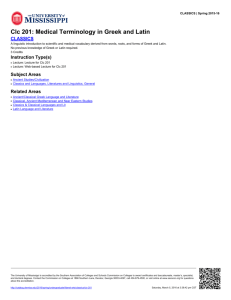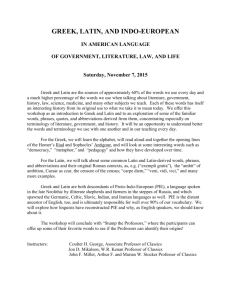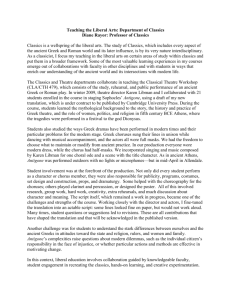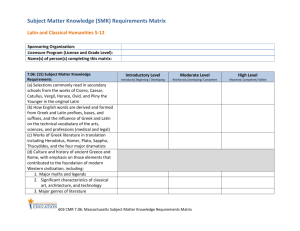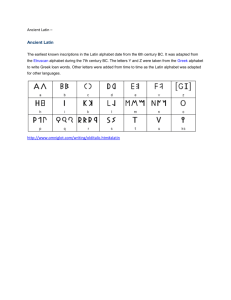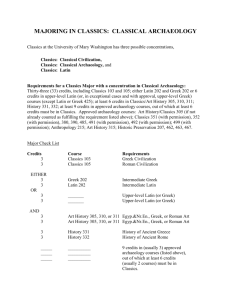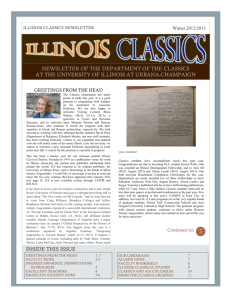An Introduction to the Ancient Languages
advertisement
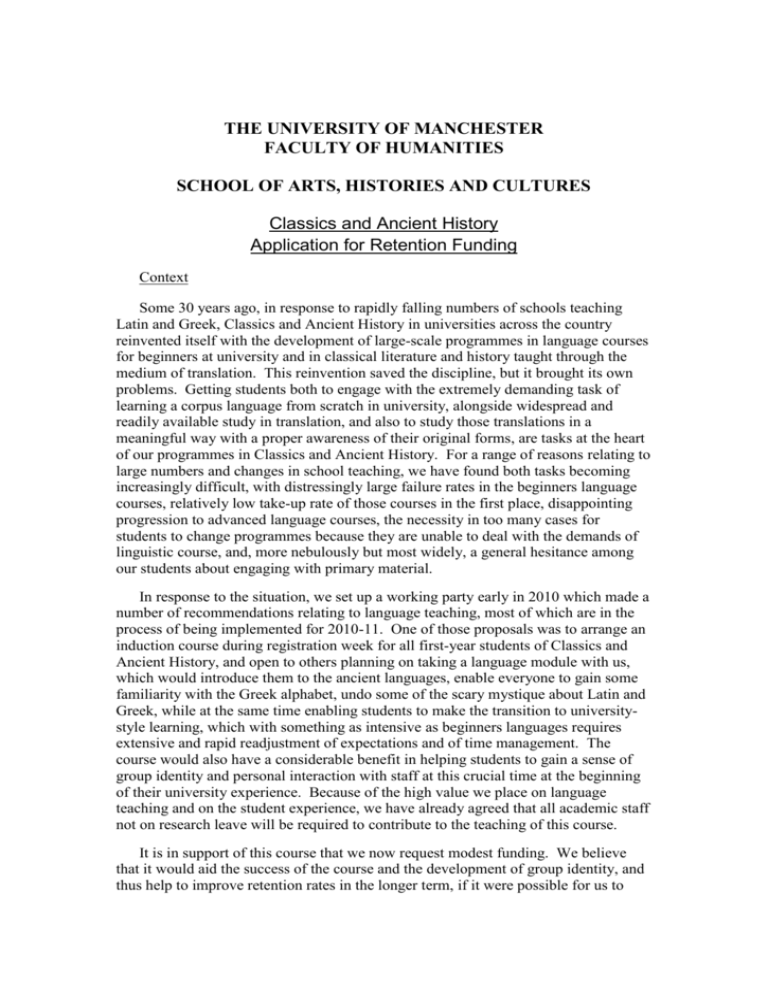
THE UNIVERSITY OF MANCHESTER FACULTY OF HUMANITIES SCHOOL OF ARTS, HISTORIES AND CULTURES Classics and Ancient History Application for Retention Funding Context Some 30 years ago, in response to rapidly falling numbers of schools teaching Latin and Greek, Classics and Ancient History in universities across the country reinvented itself with the development of large-scale programmes in language courses for beginners at university and in classical literature and history taught through the medium of translation. This reinvention saved the discipline, but it brought its own problems. Getting students both to engage with the extremely demanding task of learning a corpus language from scratch in university, alongside widespread and readily available study in translation, and also to study those translations in a meaningful way with a proper awareness of their original forms, are tasks at the heart of our programmes in Classics and Ancient History. For a range of reasons relating to large numbers and changes in school teaching, we have found both tasks becoming increasingly difficult, with distressingly large failure rates in the beginners language courses, relatively low take-up rate of those courses in the first place, disappointing progression to advanced language courses, the necessity in too many cases for students to change programmes because they are unable to deal with the demands of linguistic course, and, more nebulously but most widely, a general hesitance among our students about engaging with primary material. In response to the situation, we set up a working party early in 2010 which made a number of recommendations relating to language teaching, most of which are in the process of being implemented for 2010-11. One of those proposals was to arrange an induction course during registration week for all first-year students of Classics and Ancient History, and open to others planning on taking a language module with us, which would introduce them to the ancient languages, enable everyone to gain some familiarity with the Greek alphabet, undo some of the scary mystique about Latin and Greek, while at the same time enabling students to make the transition to universitystyle learning, which with something as intensive as beginners languages requires extensive and rapid readjustment of expectations and of time management. The course would also have a considerable benefit in helping students to gain a sense of group identity and personal interaction with staff at this crucial time at the beginning of their university experience. Because of the high value we place on language teaching and on the student experience, we have already agreed that all academic staff not on research leave will be required to contribute to the teaching of this course. It is in support of this course that we now request modest funding. We believe that it would aid the success of the course and the development of group identity, and thus help to improve retention rates in the longer term, if it were possible for us to offer refreshments to those involved. We would also like to be in a position to employ a number of teaching assistants to help with the small group sessions, since the total number of tutors required would by a considerable margin exceed the number of academic staff in the department. The original plan put forward by the working party was for a two-day course during registration week, but it was the view of the department that in the first year at any rate we should begin with a single day, with the hopes of increasing it in future. An Introduction to the Ancient Languages: Course Outline Day 1 Session 1: 9.30-10.30 Introduction. Three parallel sessions: one each for Ancient History and Classical Studies students, in each case excluding those planning on taking Advanced language in their first year (not impossible, but in practice extremely unlikely), the Classical Studies meeting to include also those Classics/Latin/Greek Course 2 students who are beginners in both their chosen languages; one meeting for all the others, who will in practice be those doing at least one advanced language. These parallel sessions would include a pep talk on the purpose and value of language-learning, tailored especially to the particular programme, together with an overview of the shape of what students can/must do in their programme. Session 2: 11-1 Crucial Information for Everyone Studying a Classical Subject. This session would be for everyone except those few with A-level Greek. It would involve learning the Greek alphabet, both for those who plan to learn Greek and for those who do not, but who would benefit from being able to look up a word in a Greek dictionary (i.e. everyone). It would also involve exercises on looking up in dictionaries Latin and Greek words which one might meet in literary or historical discussions, even when studying in translation. Finally, there would be a session on inflected languages and how to tackle them. It would be highly desirable if this session could be done in small groups. Session 3: 2-4 Classes in Latin or Greek. Those planning on taking one of the languages as a beginner would obviously go to the class for the relevant language; anyone planning on taking up both languages from scratch would normally be encouraged to go to Greek, but might have particular reason to go to Latin; those not currently planning on taking a language would be invited to choose which they would like to sample, or would otherwise be assigned to one or the other. We would use the course books planned for the elementary courses, making photocopies of the early pages so that the unsure do not have to buy anything. (I am assuming that we would cover sufficiently little of the book that this would not break copyright.) Session 4: 4-5 Retrospective and Prospective. This session would need quite a lot of people to be on hand to discuss any changes of registration (programme or course units) which might arise from the experience of the course. Budget The likely numbers attending would be over 100 students, plus 15-20 staff and assistants. We request funding under two headings: catering and teaching assistants. Coffee/tea x 3 for 120 = £630 (FoodOnCampus prices) Sandwich lunch for 120 = £450 (FoodOnCampus cheapest option) Water and juice = £100 Total for catering = £1180 In order to allow groups of around 8-10 students, even if all available staff contribute we would still require five teaching assistants, each teaching for four hours but in effect being required to be present for the whole day. The normal school rate for GTAs is £35.20 per hour. If the assistants were paid that amount for the actual teaching, it would seem reasonable that we could additionally require them to be there for the rest of the day, since the course would not involve them in much marking. 20 x £35.20 = £704 Grand total: £1884 Online technologies The working party is separately investigating the further use of online technologies to support language learning. We are aiming to learn from the experience of colleagues in modern languages, while we may also be able to build on the model of Polly Low's blackboard quizzes in first-year Greek history. Such work would relate not to this introductory course, which is decidedly face-to-face, intensive, and relational, but to the ongoing support of those (we hope, eventually, the majority) who continue with language courses. Who Will Benefit? All students on classical programmes, which have a projected intake of just over 100. A significant number of students on other programmes, both undergraduate and taught postgraduate, also take beginners language courses in Latin and Greek: although the course would be designed for new Classics undergraduates, it would be open to such others as well, and would be likely to be highly beneficial. In future it might be possible and desirable for all students on courses in mediaeval studies and related subjects to follow the Latin programme. Measuring success Success will be measured by the uptake, continuation, and pass rate for beginners language courses, progression to advanced language courses, and also (although this may only be anecdotal) in the willingness of students studying translation to engage with primary texts. It is our aim to overcome the need for forced changes of programmes for students, after one or two semesters, as a result of failure in language courses. Future funding This request for funding relates only to the course in its initial year. Since it forms part of a wider programme of measures taken to improve the student experience of language courses, success is not dependent on the identification of specific ongoing funding. Account Code AA02805
